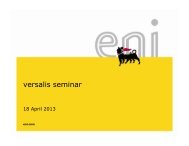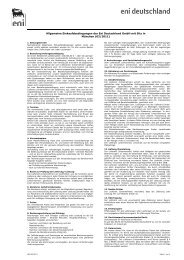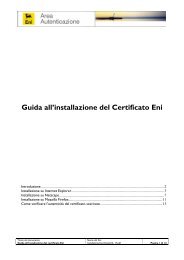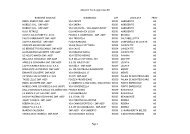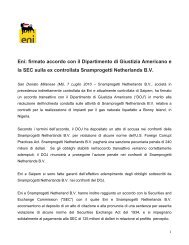È in corso il restauro conservativo del Duomo di Milano. Un ... - Eni
È in corso il restauro conservativo del Duomo di Milano. Un ... - Eni
È in corso il restauro conservativo del Duomo di Milano. Un ... - Eni
Create successful ePaper yourself
Turn your PDF publications into a flip-book with our unique Google optimized e-Paper software.
INTERVISTA - INTERVIEW<br />
64<br />
PASSATO E PRESENTE. Scholes ha lavorato per molti anni con <strong>il</strong><br />
matematico americano Fisher Black, scomparso nel 1995. Con lui ha<br />
dato vita al famoso mo<strong>del</strong>lo per <strong>il</strong> calcolo <strong>del</strong>le opzioni chiamato<br />
“Black and Scholes”. Secondo la formula <strong>il</strong> valore <strong>di</strong> un’opzione<br />
<strong>di</strong>pende da quattro elementi: la durata, <strong>il</strong> prezzo, <strong>il</strong> tasso d’<strong>in</strong>teresse e<br />
la volat<strong>il</strong>ità. Attualmente si occupa <strong>di</strong> corporate governance ed è alla<br />
guida <strong>di</strong> una società <strong>di</strong> <strong>in</strong>vestimenti, la Oak H<strong>il</strong>l Plat<strong>in</strong>um Partners.<br />
PAST AND PRESENT. Scholes worked for many years with the US<br />
mathematician Fisher Black, who <strong>di</strong>ed <strong>in</strong> 1995. Jo<strong>in</strong>tly with him<br />
he developed the well-known “Black and Scholes” option-pric<strong>in</strong>g mo<strong>del</strong>.<br />
Accord<strong>in</strong>g to this formula, the price of an option depends on four elements:<br />
expiration time, price, <strong>in</strong>terest rate and volat<strong>il</strong>ity. Currently Scholes<br />
deals with corporate governance and heads an <strong>in</strong>vestment firm,<br />
Oak H<strong>il</strong>l Plat<strong>in</strong>um Partners.<br />
alla qualità <strong>del</strong>le regole? Significa che vanno cont<strong>in</strong>uamente<br />
aggiornate e aff<strong>in</strong>ate?<br />
Le regole devono essere sufficientemente “ampie” per<br />
evitare che con<strong>di</strong>zion<strong>in</strong>o <strong>in</strong> modo eccessivo l’attività<br />
<strong>del</strong>le imprese e che fren<strong>in</strong>o la crescita. Nel concetto <strong>di</strong><br />
ord<strong>in</strong>amento “ampio”, tuttavia, contemplo al tempo<br />
stesso quello <strong>di</strong> una normativa <strong>in</strong> grado <strong>di</strong> contrastare<br />
e colpire le fro<strong>di</strong> e le pratiche scorrette. Il punto è che<br />
non si deve regolare ogni aspetto <strong>del</strong>l’attività, <strong>del</strong>la vita<br />
e <strong>del</strong> comportamento <strong>del</strong>le società, perché la natura<br />
fondamentale <strong>del</strong>le norme è – al contrario – proprio<br />
quella <strong>di</strong> permettere a ogni attività <strong>di</strong> bus<strong>in</strong>ess, a tutto<br />
<strong>il</strong> mondo degli affari, <strong>di</strong> operare <strong>in</strong> un clima globale e <strong>di</strong><br />
crescere <strong>in</strong> un contesto corretto, ord<strong>in</strong>ato. Anche un<br />
numero eccessivo <strong>di</strong> aggiornamenti <strong>del</strong>la <strong>di</strong>scipl<strong>in</strong>a f<strong>in</strong>isce<br />
per avere un effetto perverso sull’economia. Per<br />
questo parlo <strong>di</strong> un’<strong>in</strong><strong>di</strong>spensab<strong>il</strong>e “ampiezza” <strong>del</strong>la regolamentazione<br />
e <strong>di</strong>co che le mo<strong>di</strong>fiche<br />
si rendono necessarie proprio se<br />
e quando emerge che la legge ostacola<br />
o deprime la crescita economica.<br />
Le regole devono essere qu<strong>in</strong><strong>di</strong> contenute <strong>di</strong> numero,<br />
ma comportare serie penali e consentire un pronto <strong>in</strong>tervento<br />
<strong>di</strong> reazione quando vengano violate.<br />
E’sW<br />
Non si può regolamentare tutto,<br />
altrimenti si deprime l’attività.<br />
You cannot regulate everyth<strong>in</strong>g,<br />
otherwise you <strong>di</strong>scourage bus<strong>in</strong>ess.<br />
Quali sono allora le strategie migliori per ga-<br />
rantire una maggiore sicurezza – e <strong>in</strong> qualche misura<br />
una maggiore stab<strong>il</strong>ità f<strong>in</strong>anziaria – ai mercati, sia<br />
per le aziende che per gli <strong>in</strong>vestitori?<br />
L’economia è <strong>in</strong> cont<strong>in</strong>ua fluttuazione. E l’attività economica<br />
è per natura e def<strong>in</strong>izione soggetta a <strong>in</strong>certezza.<br />
Sul terreno <strong>del</strong>le strategie non si può che fare riferimento<br />
ai vari sistemi nazionali. E per una parte <strong>di</strong> paesi<br />
<strong>il</strong> <strong>di</strong>s<strong>corso</strong> è <strong>di</strong>ffic<strong>il</strong>e, perché la loro produzione – la loro<br />
“ricchezza” – si concentra <strong>in</strong> poche attività e <strong>in</strong> determ<strong>in</strong>ati<br />
settori, per cui la classica <strong>di</strong>versificazione o ri-<br />
partizione dei rischi appare <strong>in</strong> questi casi <strong>in</strong>attuab<strong>il</strong>e.<br />
Tutti possono però, secondo le rispettive <strong>di</strong>sponib<strong>il</strong>ità,<br />
creare riserve a copertura dei loro rischi economici.<br />
Ogni paese dovrebbe <strong>in</strong> sostanza prevedere una voce<br />
<strong>del</strong> b<strong>il</strong>ancio pubblico dest<strong>in</strong>ata alla gestione <strong>del</strong> rischio.<br />
E’sW<br />
Fra le materie <strong>di</strong> suo pr<strong>in</strong>cipale <strong>in</strong>teresse figu-<br />
ra senza dubbio <strong>il</strong> tema <strong>del</strong>la corporate governance e<br />
a questo proposito ha segnalato l’assoluta necessità<br />
<strong>di</strong> un impegno <strong>di</strong>retto – oltre che <strong>del</strong>le aziende e<br />
dei loro maggiori <strong>di</strong>rigenti – sia <strong>del</strong>le autorità istituzionali<br />
sia degli stessi <strong>in</strong>vestitori. Ma quali sono nella<br />
sua visione i loro rispettivi ruoli e responsab<strong>il</strong>ità?<br />
La corporate governance com<strong>in</strong>cia ai vertici <strong>del</strong>le imprese.<br />
Se <strong>il</strong> top management def<strong>in</strong>isce con chiarezza un<br />
<strong>Eni</strong>’s Way<br />
THE SEASON<br />
OF RULES<br />
Market fairness and transparency are<br />
unresolved issues.<br />
Cana<strong>di</strong>an-born US economist<br />
Myron Scholes – w<strong>in</strong>ner of the 1997 Nobel<br />
prize <strong>in</strong> economics – expla<strong>in</strong>s how comply<strong>in</strong>g<br />
with the regulations affects enterprises<br />
and <strong>in</strong>vestor behaviour.<br />
<strong>in</strong>terview with ROBERT SOLOW<br />
FEW ECONOMISTS HAVE PLAYED AN ACTIVE ROLE IN<br />
both theory and practice of f<strong>in</strong>ancial markets as<br />
Myron Scholes has. Scholes, aged 64, born <strong>in</strong><br />
Timm<strong>in</strong>s, Ontario, Canada, but who has been liv<strong>in</strong>g <strong>in</strong><br />
the US for long, reached his academic apex <strong>in</strong> 1997, when<br />
he won the Nobel Prize <strong>in</strong> economics, along with his<br />
colleague Robert Merton, for the research carried out <strong>in</strong> the<br />
f<strong>in</strong>ancial field and above all for a new method to determ<strong>in</strong>e<br />
the value of options (the third scholar who had worked with<br />
them, Fischer Black, unfortunately passed away <strong>in</strong> 1995,<br />
<strong>Eni</strong>’s Way<br />
thus <strong>di</strong>dn’t enjoy the acknowledgment of their<br />
<strong>di</strong>scovery). Then professional developments<br />
led him to engage also <strong>in</strong> on-field activities,<br />
and he now personally heads an <strong>in</strong>vestment<br />
fund, Oak H<strong>il</strong>l Plat<strong>in</strong>um Partners, where he<br />
acts as chairman and manag<strong>in</strong>g partner.<br />
What is even more noteworthy is maybe the<br />
fact he now actively deals with governance,<br />
after a long connection with the Salomon<br />
Brothers trad<strong>in</strong>g room and especially with<br />
the Long-Term Capital Management fund,<br />
which shook the <strong>in</strong>ternational f<strong>in</strong>ancial<br />
markets when it crashed, back <strong>in</strong> 1998,<br />
forc<strong>in</strong>g the US Federal Reserve to set up a<br />
‘multi-player’ rescue, <strong>di</strong>rectly <strong>in</strong>volv<strong>in</strong>g Wall<br />
Street giants.<br />
Scholes, professor emeritus at the Stanford<br />
<strong>Un</strong>iversity, is st<strong>il</strong>l engaged <strong>in</strong> academic<br />
research, develop<strong>in</strong>g the stu<strong>di</strong>es which led<br />
him, along with his colleagues, to determ<strong>in</strong>e,<br />
for the first time, follow<strong>in</strong>g a mathematical<br />
formula, the price of options non exercisable<br />
before expiration date, thus allow<strong>in</strong>g, <strong>in</strong> a<br />
broad sense, to calculate the value of other<br />
derivatives securities, too. Thanks to this set<br />
of experiences the Nobel laureate de<strong>di</strong>cated<br />
to <strong>Eni</strong>’s Way his analysis of the capital and<br />
securities markets, especially <strong>in</strong> the light of<br />
more or less recent events that drew the<br />
attention of the trade, the public and, above<br />
all, the <strong>in</strong>stitutions – both <strong>in</strong> Europe and the<br />
US – on some fundamental aspects of the<br />
<strong>in</strong>ternational f<strong>in</strong>ancial system. Start<strong>in</strong>g from<br />
corporate governance rules and f<strong>in</strong>ancial market risk, which,<br />
be<strong>in</strong>g somewhat <strong>in</strong>born, is surely the most critical aspect<br />
(and therefore a constant one) for their equ<strong>il</strong>ibrium.<br />
E’sW Regard<strong>in</strong>g risk as an <strong>in</strong>evitable factor <strong>in</strong> the f<strong>in</strong>ancial<br />
world, you recently wrote that “we have learned to manage<br />
and spread it better”, add<strong>in</strong>g, however, that it is wrong to<br />
th<strong>in</strong>k “it can be elim<strong>in</strong>ated”. Are scandals to be considered<br />
<strong>in</strong>evitable, too, then?<br />
The risk factor cannot be elim<strong>in</strong>ated. In the market the best<br />
we can do is to transfer it to those who know how to<br />
manage it. The same goes for scandals: corporate<br />
governance w<strong>il</strong>l never be complete. Even with strict rules and<br />
controls, some managers w<strong>il</strong>l end up mak<strong>in</strong>g mistakes,<br />
which w<strong>il</strong>l cause defaults or crashes. Those who set the<br />
rules must be careful, though: they should not make them<br />
so strict as to prevent companies from work<strong>in</strong>g properly.<br />
E’sW Thus, is the real problem about the quality of rules?<br />
Does that mean they must constantly be updated and<br />
ref<strong>in</strong>ed?<br />
Rules just have to be sufficiently “broad”, to avoid<br />
con<strong>di</strong>tion<strong>in</strong>g enterprise activity too much, h<strong>in</strong>der<strong>in</strong>g their<br />
growth. Nonetheless, the concept of “broad” regulations<br />
also <strong>in</strong>cludes that of norms capable of efficiently hold<strong>in</strong>g off<br />
and punish frauds and unfair behaviour. The po<strong>in</strong>t is that you<br />
shouldn’t regulate all aspects of corporate activity, life and<br />
behaviour, because the very basic nature of regulation is<br />
65



